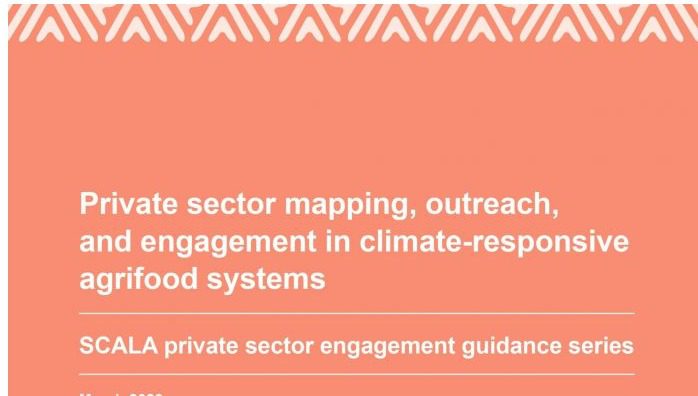SCALA's Private Sector Engagement Facility Programme is open to support countries to accelerate investments in low-carbon and climate-resilient agricultural practices by mobilising private sector actors in the implementation of Nationally Determined Contributions (NDCs) and National Adaptation Plans (NAPs).
Objectives
- The Scaling up Climate Ambition on Land Use and Agriculture (SCALA) Private Sector Engagement Facility (PSEF) is launched by the programme to promote stronger partnerships and dialogues between the public and private sectors through demand-led approaches based on countries' national agricultural and land use sector priorities. It seeks to identify private sector-oriented interventions and involve companies and investors in the implementation of climate plans to mobilise resources and develop innovative climate service solutions.
- SCALA's Private Sector Engagement Facility will draw on tools, emerging lessons and partnerships developed under the programme to provide support to selected non-SCALA countries.
- The main beneficiaries of this mechanism are public sector players (Ministry of the Environment, Ministry of Agriculture, etc.) in terms of co-designing and receiving specific support to catalyse private sector action.
- Countries can request support depending on their needs in three distinct service areas. Developing a scope of work in collaboration with countries will incorporate some of these activities to achieve tangible results, with the ultimate aim of attracting private funding for climate action initiatives.
- As such, each service area represents a cohesive set of interventions to help achieve milestones that lead to this ultimate goal. Countries can apply for support in different service areas depending on the existing level of private sector engagement, as it is understood that different countries will have different levels of advancement in relation to private sector engagement. It is suggested that applicants focus on one line of service for maximum impact.
Modalities
Modalities for developing SCALA capacities at the individual, organisational and enabling environment levels:
- Publicising, mapping opportunities and facilitating multi-stakeholder engagement
- Overview of the agricultural sector or value chain, mapping and analysis of the private sector and ecosystem, engagement and dissemination (customised consultations depending on the government's needs).
- Support multisectoral dialogue with the private sector and facilitate the integration, representation and considerations of the private sector in multisectoral committees or NAP/NDC governance bodies.
- Training in leadership approaches and systems change.
- Risk Assessment and Business Opportunities
- Identify, prioritise and assess business opportunities that support climate action targets for a given commodity or value chain, as well as the associated barriers and risks that prevent private sector investment in them, through stakeholder consultations.
- Analysing the value chain of a given commodity, with a particular focus on identifying opportunities for private sector engagement and investment within the value chain, and associated barriers/risks.
- Carry out a market assessment on a particular commodity or product that has been produced using climate resilient practices.
- Carry out a feasibility study on relevant private sector-orientated initiatives in the land use and agriculture sector that contribute to the fulfilment of climate action targets.
- Reducing risks and enabling private sector investment
- Identify de-risking instruments that can improve the enabling environment and incentivise private sector investment in NDC/NAP priorities.
- Economic/Financial analysis of de-risking strategies.
- Incubate de-risking strategies through concept refinement, partnership development, and matchmaking support.
Funding Information
- Budget: Each country proposal is eligible for a total budget of USD 50,000. One proposal is allowed per country.
- Support requested must be achievable within a maximum period of 12 months, with agreed-upon deliverables within a customised scope of work expected to be completed within this timeframe. If required, an additional 6 months can be granted.
Expected impact
- Generating knowledge
- Gain a stronger understanding and insight into the needs and challenges of the private sector, the levers for change, the incentives and the gaps that prevent participation in climate policy.
- Promoting a common understanding of adaptation challenges and opportunities, informing climate policy and supporting the design of climate-resilient interventions that go beyond "Business as Usual".
- Increase collaboration and build trust
- Increase dialogue and collaboration with the private sector and identify potential partners for project development.
- Strengthen consensus building, shared vision and direction, encouraging prior agreement between the Ministries/UNFCCC and the Focal Points in the UN Agencies on areas and value chains that require strategies
- interventions with the private sector, guaranteeing dialogue and environmental governance from the outset.
- Promoting participatory engagements with an inclusive and gender-sensitive approach, with the aim of building trust among stakeholders and facilitating resource mobilisation processes.
- The countries prioritised for the 2023 call include Small Island Developing States (SIDS) and middle-income countries. Countries must be eligible for Official Development Assistance (ODA), as defined by the Development Assistance Committee (DAC) of the Organisation for Economic Co-operation and Development (OECD), with a strong focus on agriculture and land use in their NDCs and/or NAPs.
- Governments can apply through the Ministry of Environment/UNFCCC Focal Points in consultation with the Ministry of Agriculture and other relevant public institutions dealing with climate change, as well as to align with UNDP-FAO country programmes.
- An Expression of Interest (EoI) form will be shared with the UNFCCC Focal Points by the SCALA Programme Leaders, including instructions for completing and submitting the EoI.
Deadline: 19-Aug-23
Click HERE to sign up


